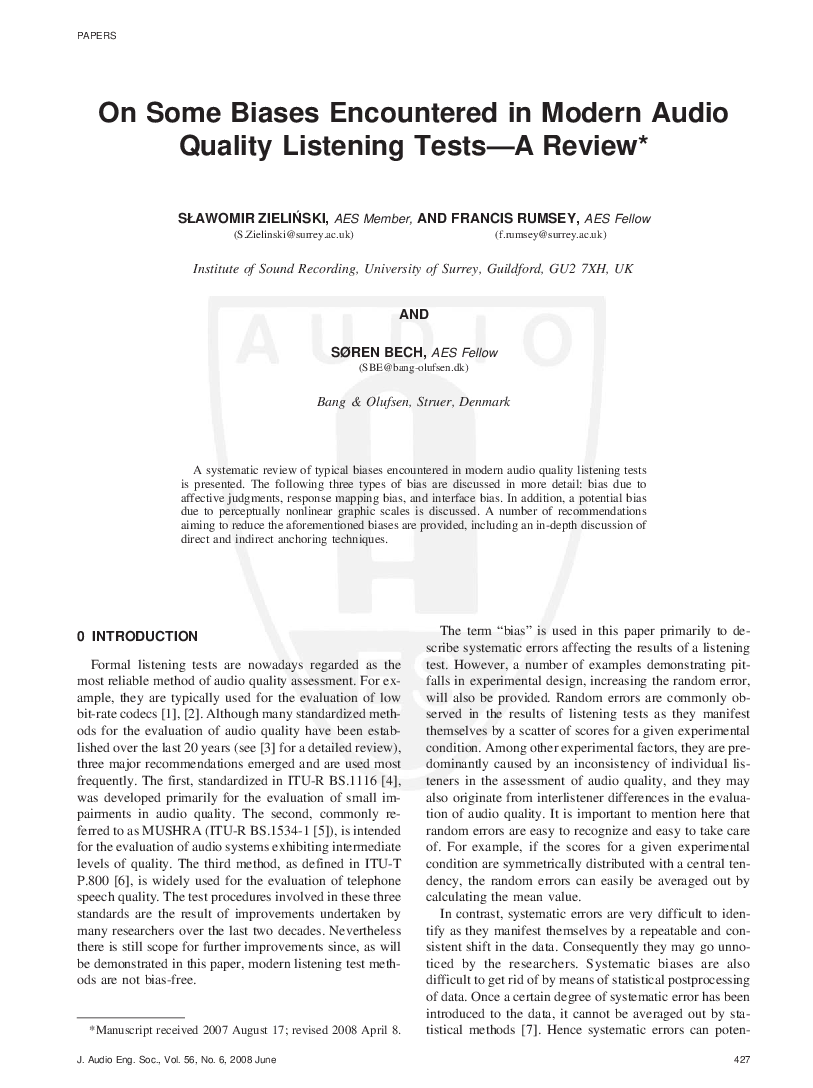Home / Publications / E-library page
You are currently logged in as an
Institutional Subscriber.
If you would like to logout,
please click on the button below.
Home / Publications / E-library page
Only AES members and Institutional Journal Subscribers can download
A careful evaluation of listening tests designed to measure audio quality shows that they are vulnerable to systematic errors, which include biases due to affective judgments, response mapping bias, and interface bias. As a result of factors such as personal preferences, the appearance of the equipment, and the listeners` expectations or mood, errors can range up to 40% with respect to the total range of the scale. As a general conclusion, test results should be considered relative, rather than absolute. Scales in previous studies, which have been assumed to be linear, may exhibit departure from linearity. The visual appearance of the user interface may lead to severe quantization of the distribution of scores. Recommendations are offered to improve audio quality tests.
Author (s): Zielinski, Slawomir; Rumsey, Francis; Bech, Søren
Affiliation:
Institute of Sound Recording, University of Surrey, Guildford, GU2 7XH, UK ; Bang & Olufsen, Struer, Denmark
(See document for exact affiliation information.)
Publication Date:
2008-06-06
Import into BibTeX
Permalink: https://aes2.org/publications/elibrary-page/?id=14393
(670KB)
Click to purchase paper as a non-member or login as an AES member. If your company or school subscribes to the E-Library then switch to the institutional version. If you are not an AES member Join the AES. If you need to check your member status, login to the Member Portal.

Zielinski, Slawomir; Rumsey, Francis; Bech, Søren; 2008; On Some Biases Encountered in Modern Audio Quality Listening Tests-A Review [PDF]; Institute of Sound Recording, University of Surrey, Guildford, GU2 7XH, UK ; Bang & Olufsen, Struer, Denmark; Paper ; Available from: https://aes2.org/publications/elibrary-page/?id=14393
Zielinski, Slawomir; Rumsey, Francis; Bech, Søren; On Some Biases Encountered in Modern Audio Quality Listening Tests-A Review [PDF]; Institute of Sound Recording, University of Surrey, Guildford, GU2 7XH, UK ; Bang & Olufsen, Struer, Denmark; Paper ; 2008 Available: https://aes2.org/publications/elibrary-page/?id=14393
@article{zielinski2008on,
author={zielinski slawomir and rumsey francis and bech søren},
journal={journal of the audio engineering society},
title={on some biases encountered in modern audio quality listening tests-a review},
year={2008},
volume={56},
issue={6},
pages={427-451},
month={june},}